Why investing in Barcelona´s value-added projects in 2017–2018 is a must
Having recovered from the crisis, the Spanish economy is regaining ground: if in 2009 the GDP growth rate fell to a historic low
Catalonia is the most developed
However, despite the positive signals, it is difficult to be sure about Spanish and, consequently, Catalonian
According
Low interest rates
The main reason for growth market Spain-wide and, particularly, that of Barcelona, is the low interest rates.
EU mortgage rates are based on Euribor, an interbank offered rate. The rate has been falling continuously since June 2014, and in October of the same year it reached a negative value for the first time; contrast this with a value above 4% at the onset of the 2008 crisis.
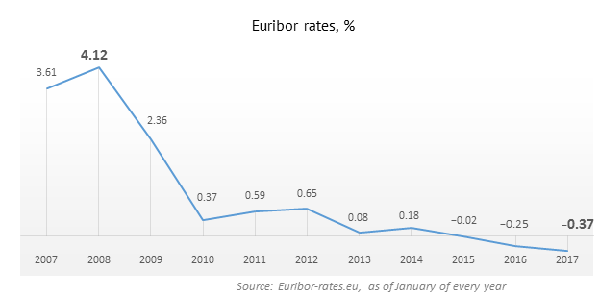
Spanish banks provide non-residents with up to 60% LTV loans at 2.5% per annum on average, whilst for residents the conditions are even more attractive: they can take out a loan with up to 80% LTV at as little as 1.5% per annum.
Price growth potential
As of Q1 2017, property prices in Spain have fallen 42% in comparison with
According to Idealista.com, property prices in Barcelona fell by 37% between
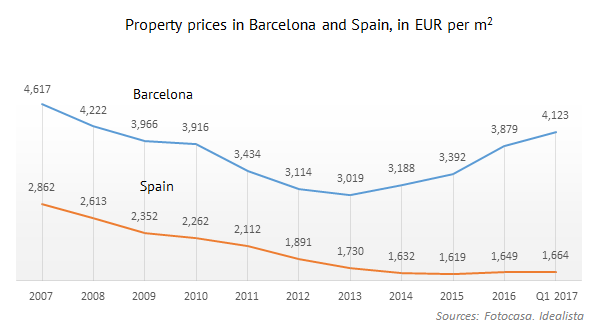
Real estate in Barcelona is more expensive than in Spain on average: in 2017, the average square metre price turned out to exceed the national average by 2.5 times. Furthermore, price increases per square metre are growing more rapidly: in Q1 2017, the prices for property in Barcelona increased by 6% more than the 2016 average, which exceeds the Spanish average by 6 times. However, prices have still not reached
Yield and rent increase
According to Idealista.com, in Q4 2016 the average rental rate in Barcelona ran at €17.9 per square metre per month; exceeding
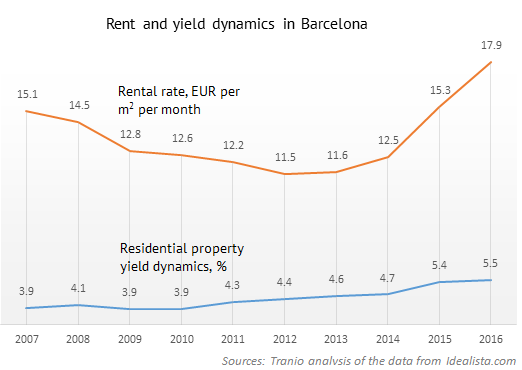
Between Q4 2015 and Q4 2016, property prices in Barcelona grew by 14%, and rental rates grew by 17%. Rent dynamics are outpacing residential property price growth, and so the trend for
Demand exceeds supply
Prior to 2012, the volume of construction taking place outstripped the pace of new-build sales. However, since then, a reverse in the trend can be observed. In 2014, the gap was the biggest: the number of transactions involving
Both figures demonstrate positive dynamics after the dramatic fall in 2013. Between 2013 and 2016 the number of transactions involving
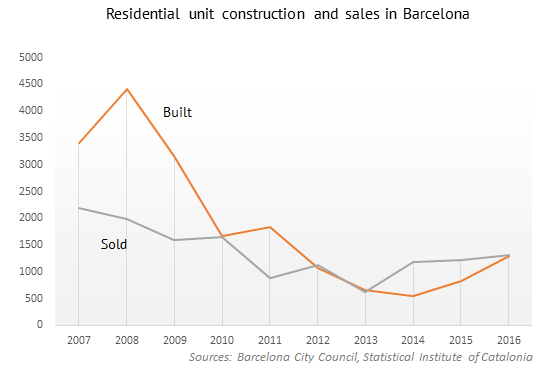
According to CBRE, Barcelona needs 7,900 newly built properties per annum, while fewer than 2,000 are under construction. Therefore, the demand for newly built properties exceeds the supply significantly. According to Sociedad de Tasación, a real estate appraisal company, the supply
Population and private consumption increase
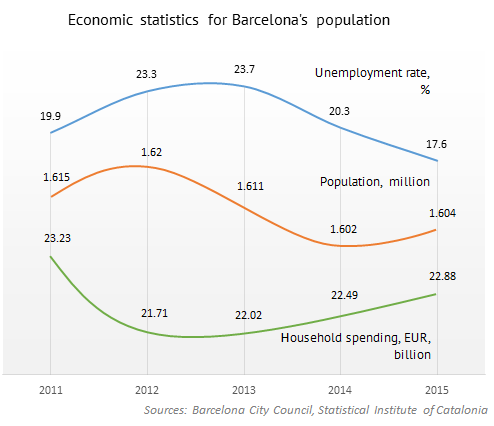
Private consumption has been growing in Barcelona since 2013. It amounted to €22.88 billion by 2015; an increase of 5.4%. According to the Barcelona City Council, as of 2015, household spending was 14% higher than the national average.
The unemployment rate is gradually decreasing after reaching a peak of 23.7% in 2013. In 2016 it dropped to 14.4%.
Growth in tourists
According to European Cities Marketing,
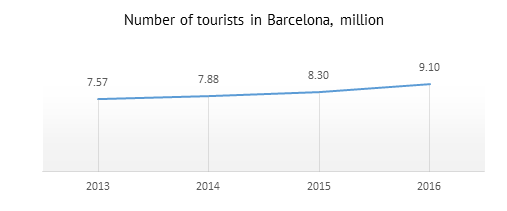
According to the Barcelona City Council, 80% of all tourists are foreign nationals, leaving 20% of inbound tourism originating from other regions in Spain.
Tourists are also attracted to Barcelona
Development prospects for Barcelona's property market
In 2017, the main trends in the Barcelona property market will be the following:
- residential property price and rental rate growth: according to a PwC forecast, in 2017 residential property prices will increase by 3.6% and rental rates are to rise by 3.7%;
- yield growth: as rental price increases are set to remain ahead of price growth, yields will increase;
- demand growth: mortgage rates are set to remain low, meaning sales will continue to rise;
new-build property shortage: the supply in the newly built property market at present cannot match growing demand, resulting in investor interest shifting tovalue-added projects in the future.
Rental property investments are perfect for those who plan on relocating or sending their children to study in Barcelona. By obtaining incomes in the currency of their future expenses, these investors minimise the consequences of inflation risks.
We recommend considering the scenario of buying real estate in small towns and municipalities around Barcelona such as Badalona and
We will send you a content digest not more than once a week